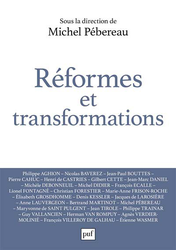Thesaurus : Doctrine

► Full Reference: Auteur, "Titre", in M.-A. Frison-Roche (ed.), Compliance Obligation, Journal of Regulation & Compliance (JoRC) and Bruylant, "Compliance & Regulation" Serie, to be published
____
📘read a general presentation of the book, Compliance Obligation, in which this article is published
____
► Summary of the article (done by the Journal of Regulation & Compliance - JoRC): The author takes up the hypothesis of a Compliance Law defined by its Monumental Goals, the realisation of which is entrusted to "crucial operators" and confronts it with Tax Law. The link is particularly effective since these operators possess what governments need in this area: relevant Information.
Going further, Compliance Law can give rise to two types of obligations on the part of these operators, either towards others operators who need to be monitored, corrected or denounced, or towards themselves, when they need to make amends.
In the first part of this contribution, the author shows that Compliance Obligation reproduces the mechanism of a Tax Law which, for large companies, is embroiled in a process of increasing Globalisation. It enables Governments to aspire to the "Monumental Goals" of combating tax optimisation and impoverishing governments, victims of the erosion of the tax base, in the face of the strategies of companies that are more powerful than they are themselves, by using this very power of firms to turn it against them. Companies become the willing or de facto allies of governments, particularly when it comes to recovering tax debts, or assist them in their stated ambition to achieve social justice. In this way, the State "manages" Tax Law by cooperating with companies.
In the second part, the author outlines the contours of this business Compliance Obligation, which is no longer simply a matter of paying tax. Beyond this financial obligation, it is more a question of mastering Information, particularly when multinational companies are subject to specific tax reporting obligations and are required to reveal their tax strategy, presumed to be transparent and coherent within the group : this legal presumption gives rise to obligations to seek information and ensure coherence, since a single tax strategy is not self-evident in a group.
The author emphasises that companies have accepted the principles governing these new compliance obligations and are tending to transform these obligations, particularly Transparency, into a communication strategy, in line with the ESG criteria that have been developed and a desire for fruitful relations with stakeholders. Therefore the tax relations developed by major companies are being extended not only to the tax authorities, but also to NGOs, by incorporating a strong ethical dimension. This is leading to new strategies, particularly in the area of Vigilance.
The author concludes: "A n’en pas douter, l’obligation de compliance existe bel et bien en matière fiscale." ("There is no doubt that the Compliance Obligation does exist in tax matters").
____
🦉This article is available in full text to those registered for Professor Marie-Anne Frison-Roche's courses
________
Thesaurus : Doctrine

► Full Reference: D. Gutmann, "Droit fiscal et obligation de compliance" (Tax Law and Compliance Obligation), in M.-A. Frison-Roche (dir.), L'Obligation de Compliance, Journal of Regulation & Compliance (JoRC) and Dalloz, coll. "Régulations & Compliance", 2024, to be published
____
► English summary of this contribution (done by the Journal of Regulation & Compliance): The author takes up the hypothesis of a Compliance Law defined by its Monumental Goals, the realisation of which is entrusted to "crucial operators" and confronts it with Tax Law. The link is particularly effective since these operators possess what governments need in this area: relevant Information.
Going further, Compliance Law can give rise to two types of obligations on the part of these operators, either towards others operators who need to be monitored, corrected or denounced, or towards themselves, when they need to make amends.
In the first part of this contribution, the author shows that Compliance Obligation reproduces the mechanism of a Tax Law which, for large companies, is embroiled in a process of increasing Globalisation. It enables Governments to aspire to the "Monumental Goals" of combating tax optimisation and impoverishing governments, victims of the erosion of the tax base, in the face of the strategies of companies that are more powerful than they are themselves, by using this very power of firms to turn it against them. Companies become the willing or de facto allies of governments, particularly when it comes to recovering tax debts, or assist them in their stated ambition to achieve social justice. In this way, the State "manages" Tax Law by cooperating with companies.
In the second part, the author outlines the contours of this business Compliance Obligation, which is no longer simply a matter of paying tax. Beyond this financial obligation, it is more a question of mastering Information, particularly when multinational companies are subject to specific tax reporting obligations and are required to reveal their tax strategy, presumed to be transparent and coherent within the group : this legal presumption gives rise to obligations to seek information and ensure coherence, since a single tax strategy is not self-evident in a group.
The author emphasises that companies have accepted the principles governing these new compliance obligations and are tending to transform these obligations, particularly Transparency, into a communication strategy, in line with the ESG criteria that have been developed and a desire for fruitful relations with stakeholders. Therefore the tax relations developed by major companies are being extended not only to the tax authorities, but also to NGOs, by incorporating a strong ethical dimension. This is leading to new strategies, particularly in the area of Vigilance.
The author concludes: "A n’en pas douter, l’obligation de compliance existe bel et bien en matière fiscale." ("There is no doubt that the Compliance Obligation does exist in tax matters").
____
📕read the general presentation of the book, L'obligation de Compliance, in which this contribution is published
________
March 28, 2021
Compliance: at the moment

Nov. 21, 2018
Thesaurus : Doctrine

Référence complète : Pébereau, M. (dir.), Réformes et transformations, PUF, novembre 2018, 606 p.
Présentation de l'ouvrage : Un chômage structurel de 9 %, une dette publique approchant 100 % du PIB, une compétitivité déclinante, des déficits commerciaux quasi structurel : depuis trop longtemps, les indices d'un recul des performances économiques de la France s'accumulent, mettant en danger son modèle social et sa place dans le monde. Une réaction paraît s'être produite à la faveur de la dernière élection présidentielle et les premières mesures opérées par le gouvernement d'Emmanuel Macron et d'Édouard Philippe ont fait la preuve que la réforme était possible. Mais le processus qui doit permettre à la France d'affronter sereinement les défis de la mondialisation et des révolutions technologiques est encore long.
Fruit des communications tenues tout au long de l'année 2017 devant l'Académie des sciences morales et politiques, les vingt-six études réunies dans ce volume n'évitent aucun sujet brûlant : droit du travail, fiscalité, retraite, éducation, etc. Rédigées par les meilleurs spécialistes, sans complaisance ni idéologie, elles posent un diagnostic informé sur nos problèmes et proposent des remèdes pour corriger les handicaps les plus criants en anticipant les enjeux à venir.
La France n'est pas dépourvue de forces vives qui ne demandent qu'à servir, une fois libérées des schémas obsolètes dans lesquels nous les tenons enfermées. Aux citoyens de solliciter et soutenir les efforts de transformation nécessaires. Aux hommes politiques de les engager. La seule ambition de cet ouvrage est de les y aider.
Ce cycle de réflexions de l'Académie des sciences morales et politiques sur les réformes et transformations a été proposé et animé par Michel Pébereau, président de l'Académie en 2017.
Consulter la table des matières.
Lire la quatrième de couverture.
Feb. 14, 2018
Thesaurus : Doctrine
Référence complète : Pando, A. , Les propositions de la professions comptable pour le plan pour la croissance et la transformation des entreprises, Petites Affiches, 14 février 2018, p.4 à 6.
Les étudiants de Sciences po peuvent lire l'article via le drive dans le dossier MAFR - Régulation & Compliance.
Les experts-comptables demandent :
- que l'entreprise individuelle est une personnalité juridique autonome (pour protéger l'entrepreneur) mais un régime fiscal et social pourtant harmonisé puisqu'il s'agit d'un entrepreneur ;
- de favoriser la transformation de l'entreprise individuelle en société, par un sursis d'imposition ;
- de remédier à la sous-utilisation du dispositif "Dutreil" pour la transmission d'entreprise, parce que trop lourd, en supprimant l'obligation de déclaration annuelle et de conservation collective des titres, pour n'imposer cela qu'aux seuls bénéficiaires de la transmission d'entreprises ;
- d'inciter à prêter pour reprendre des entreprises en accroissant la déduction des intérêts d'emprunt ;
- d'inciter à des financement alternatif pour les petites entreprises ;
- de supprimer les restrictions territoriales concernant les allégements fiscaux d'incitations à la recherche, notamment en matière de brevet ;
- de supprimer le caractère optionnel du régime fiscal des sociétés mère-fille, qui ne se justifie que par le mécanisme de l'avoir fiscal ;
- de développer le crédit d'impôt pour le développement international de l'entreprise ;
- de rétablir l'imputabilité des déficits réalisés à l'étranger, ce qui incite également au développement international.